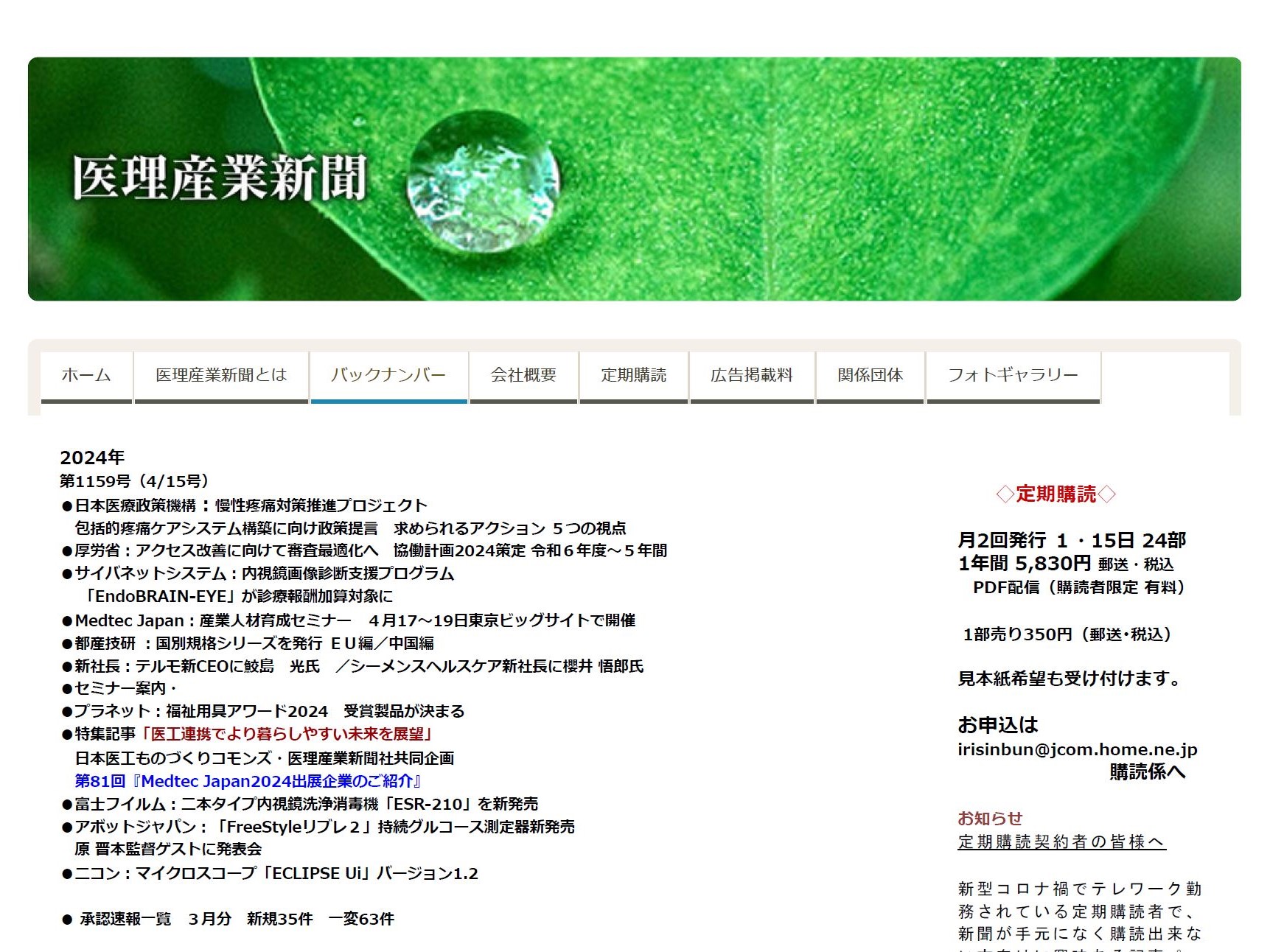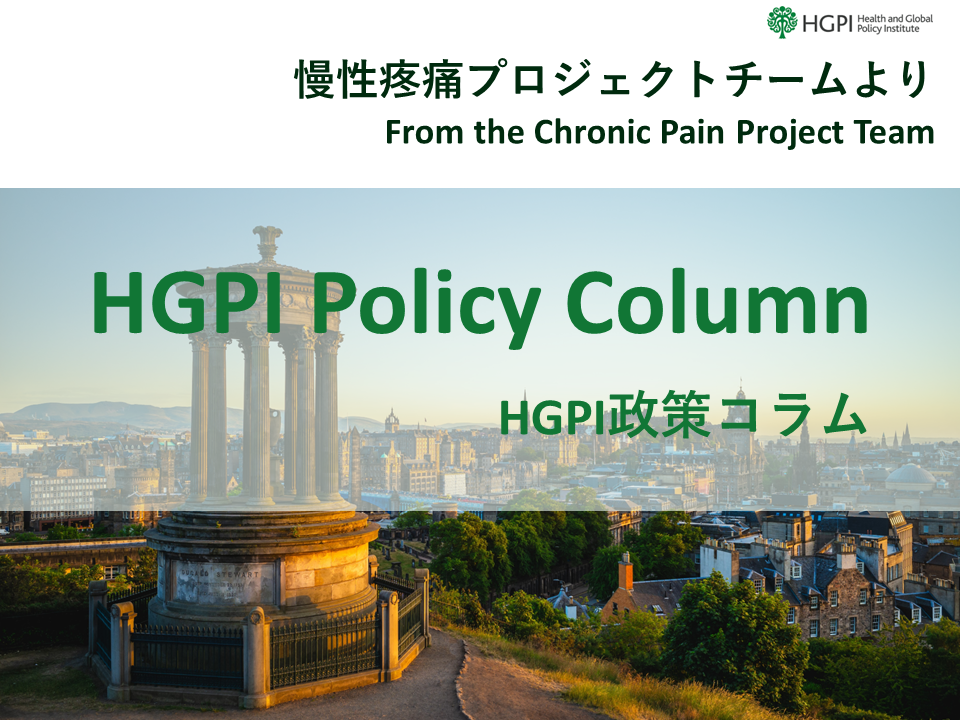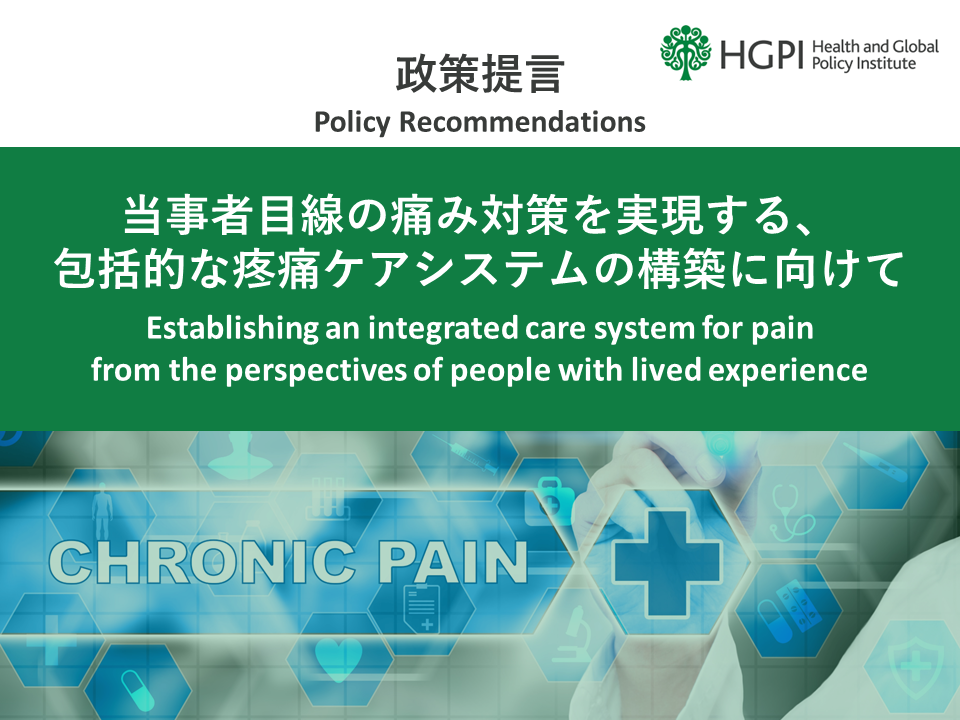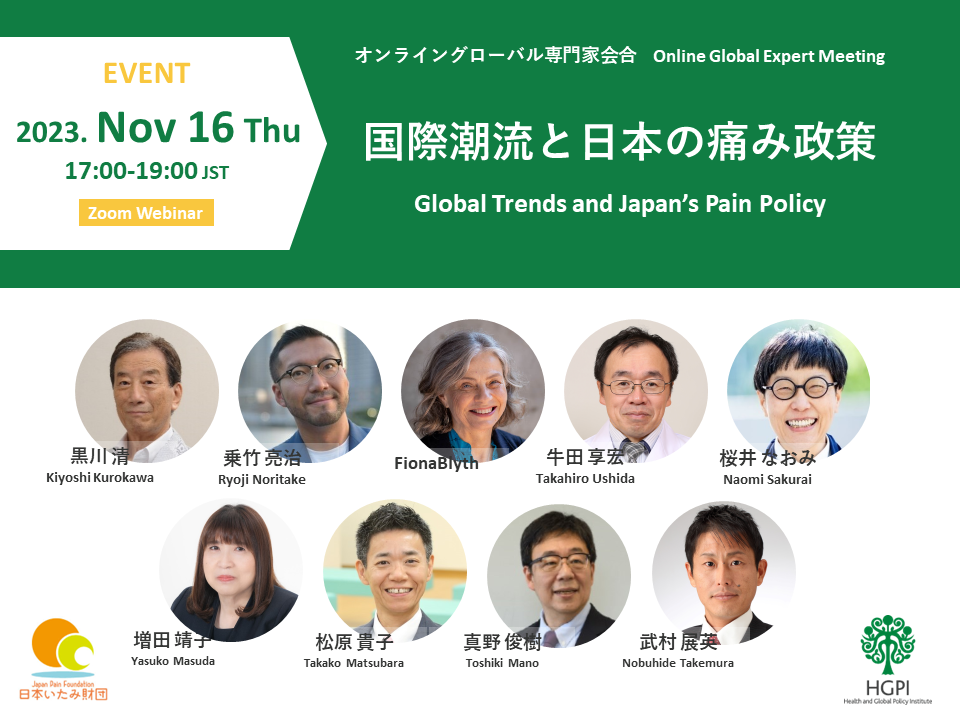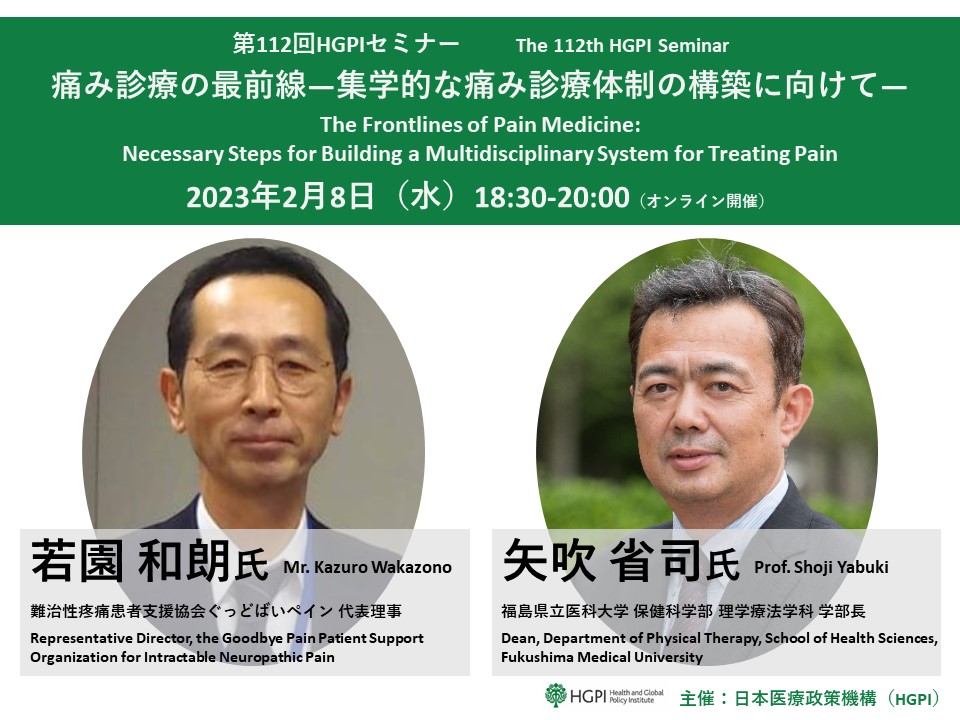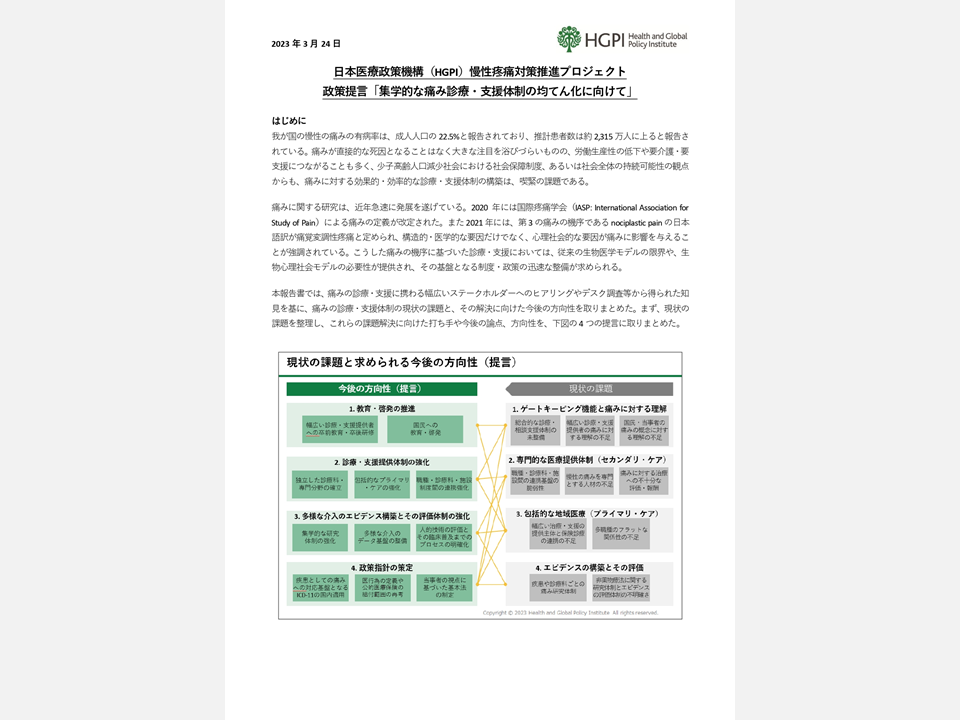[Policy Recommendations] Establishing a System That Makes Full Use of Primary Care Physicians and Can Respond to Complex Chronic Pain (July 31, 2024)
date : 7/31/2024
Tags: Chronic Pain, NCDs
![[Policy Recommendations] Establishing a System That Makes Full Use of Primary Care Physicians and Can Respond to Complex Chronic Pain (July 31, 2024)](https://hgpi.org/en/wp-content/uploads/sites/2/ncd-cp-20240731-top.png)
Health and Global Policy Institute (HGPI) Chronic Pain Project views chronic pain as a key social issue, which brings notable economic losses and often leads elderly people to long-term care and support. Since FY2021, we have been taking action to encourage measures for better and equitable pain management services.
For timely and appropriate interventions to pain, which is multi-factorial and unique to individuals, primary care has a key role to play. In Japan, the role of primary care physicians is now at a historical turning point. The system surrounding primary care physicians has been the subject of debate for many years, but after the 2023 enactment of the “Act Partially Amending the Health Insurance Act and Other Acts for in Order to Establish a Sustainable Social Security System That Covers All Generations,” comprehensive discussions on the April 2025 introduction of a system related to primary care physicians are accelerating. Given this context, we offer the following recommendations in hopes that the system for making more effective use of primary care physician services that is currently being discussed will make it possible to provide appropriate and timely services for chronic pain of all mechanisms and complexities.
For more information, please find the PDF document at the bottom.
Policy Recommendations on Establishing a System That Makes Full Use of Primary Care Physicians and Can Respond to Complex Chronic Pain
Recommendation 1: Primary care physician services should be strengthened so primary care physicians can stay close to patients’ pain regardless of its mechanism or complexity and serve as the gateway to healthcare while providing appropriate treatment and referrals to specialists.Recommendation 2: While taking into account the latest findings in pain science and how chronic pain is classified in the International Classification of Diseases, steps should be taken to develop reporting items related to primary care physician services as well as programs that provide primary care physicians with training and recurrent education.
Recommendation 3: A collaborative system that links primary care physicians and a wide range of community resources including pain centers should be established so people can receive a wide range of evidence-based interventions in their communities and, when necessary, have rapid access to multidisciplinary pain care.
Recommendation 4: Ample consideration should be given to the perspectives of pain science experts and healthcare beneficiaries during discussions on the functions of primary care physicians held at Regional Consultation Forums on Ambulatory Care.
Top Research & Recommendations Posts
- [Research Report] Perceptions, Knowledge, Actions and Perspectives of Healthcare Organizations in Japan in Relation to Climate Change and Health: A Cross-Sectional Study (November 13, 2025)
- [Research Report] The 2025 Public Opinion Survey on Healthcare in Japan (March 17, 2025)
- [Policy Recommendations] Mental Health Project: Recommendations on Three Issues in the Area of Mental Health (July 4, 2025)
- [Research Report] The 2023 Public Opinion Survey on Satisfaction in Healthcare in Japan and Healthcare Applications of Generative AI (January 11, 2024)
- [Policy Recommendations] Developing a National Health and Climate Strategy for Japan (June 26, 2024)
- [Announcement] HGPI Endorses the “Belém Health Action Plan” (November 14, 2025)
- [Policy Recommendations] Reshaping Japan’s Immunization Policy for Life Course Coverage and Vaccine Equity: Challenges and Prospects for an Era of Prevention and Health Promotion (April 25, 2025)
- [Policy Recommendations] Recommendations on Strategic Investments in Policies for Brain Health to Revitalize Japan: Hopes for the New Administration (December 1, 2025)
- [Announcement] HGPI Joins Global Green and Healthy Hospitals (August 1, 2023)
- [Research Report] Survey of Japanese Nursing Professionals Regarding Climate Change and Health (Final Version) (November 14, 2024)
Featured Posts
-
2025-12-09
[Event Report] Special Seminar “Rising to New Challenges in Health Sciences for Future Society: Novel Developments in the Field of Epilepsy in Japan and Globally” Belgium Pavilion Special Seminar, World Expo 2025 Osaka, Kansai (September 18, 2025)
![[Event Report] Special Seminar “Rising to New Challenges in Health Sciences for Future Society: Novel Developments in the Field of Epilepsy in Japan and Globally” Belgium Pavilion Special Seminar, World Expo 2025 Osaka, Kansai (September 18, 2025)](https://hgpi.org/en/wp-content/uploads/sites/2/HGPI_20250805_mental-health-expo-eyechatch.png)
-
2025-12-11
[Event Report] Core Components of Universal Health Coverage (UHC): Achieving “Healthcare Without Financial Hardship” in Asia-Pacific and Japan (December 5, 2025)
![[Event Report] Core Components of Universal Health Coverage (UHC): Achieving “Healthcare Without Financial Hardship” in Asia-Pacific and Japan (December 5, 2025)](https://hgpi.org/en/wp-content/uploads/sites/2/HGPI_20251210_Core-Components-of-Universal-Health-CoverageUHC-top.jpg)
-
2025-12-12
[Registration Open] Meaningful Involvement Promotion Project Urgent Symposium “The New Takaichi Administration and Central Social Insurance Medical Council Reform – Ensuring Patients’ Voices are Heard” (January 22, 2026)
![[Registration Open] Meaningful Involvement Promotion Project Urgent Symposium “The New Takaichi Administration and Central Social Insurance Medical Council Reform – Ensuring Patients’ Voices are Heard” (January 22, 2026)](https://hgpi.org/en/wp-content/uploads/sites/2/HGPI_20251208_urgent-symposium-1.png)
-
2025-12-12
[Registration Open] (Webinar) The 140th HGPI Seminar “Early Detection to Reduce COPD Disease Burden: Connecting Clinical Frontiers with Health Policy” (January 27, 2026)
![[Registration Open] (Webinar) The 140th HGPI Seminar “Early Detection to Reduce COPD Disease Burden: Connecting Clinical Frontiers with Health Policy” (January 27, 2026)](https://hgpi.org/en/wp-content/uploads/sites/2/hs140-top.png)
-
2025-12-16
[Discussion Points] Policy Dialogue “Considering Comprehensive Genomic Profiling from the Perspective of Patient Access: Utilizing the Medical Service Fee Reimbursement System and the Mixed Medical Services Program to Meet the Needs of Today” (November 28, 2025)
![[Discussion Points] Policy Dialogue “Considering Comprehensive Genomic Profiling from the Perspective of Patient Access: Utilizing the Medical Service Fee Reimbursement System and the Mixed Medical Services Program to Meet the Needs of Today” (November 28, 2025)](https://hgpi.org/en/wp-content/uploads/sites/2/eyecatch_Policy-Dialogue_Discussion-Points_20251128.jpg)




